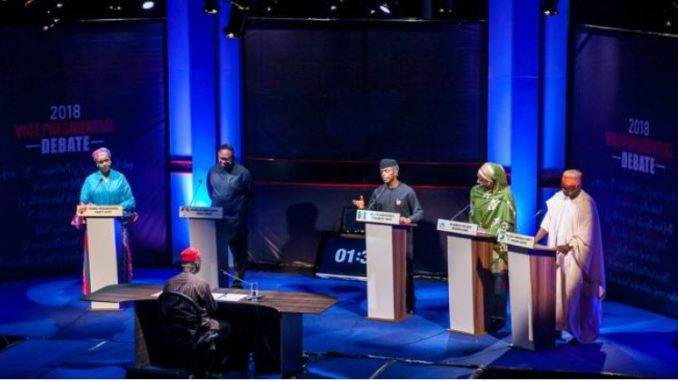
Last Friday, almost all Nigerians of voting age were glued to their television sets to watch the vice presidential candidates’ debate between Abdulganiyu Galadima (ACPN), Khadijah Abdullahi-Iya (ANN), Yemi Osinbajo (APC), Peter Obi (PDP) and Umma Getso (YPP), while many others had to rely on threads of conversation and live reportage on social media.
As the debate continued in Abuja, Johannes Tobi (@Johannxs), a lawyer and member of President Muhammadu Buhari’s media team, tried to do his job by countering the PDP vice presidential candidate’s statement with a social media post by saying, “I knew this PDP man, Peter Obi, would start with lies and contrived data”.
As expected, many members of the opposition party disagreed with his statement and some of them decided to voice their opinion. It turns out that one of them has a day job as handler of the official Guinness Nigeria Twitter page. His response, which can be argued to be typical of what you will see all across TwitterNG this political season, kicked off a social media storm because it mistakenly came off the company handle, not his personal handle.
A lot of questions arise at this point. Was this intentional? If not, should a public relations professional be allowed to perform official duties on personal devices?
Anyone following this line of thought and knows how social media platforms, e.g. Facebook, Instagram, Twitter, and other work understands that users can manage several accounts on a single device, allowing them to transition from one page to the other. This way, it is easier to get notifications, manage responses, and control conversations on a single phone, laptop, iPad and other devices. If this was done deliberately – which is hard to believe – in order to create a controversial buzz about the Guinness Nigeria brand, this would probably be biggest self-inflicted PR disaster ever witnessed in the country. But I think not.
Following the social media booboo, an official statement was released by Terragon Limited, the digital agency which manages Guinness Nigeria’s Twitter account, apologizing for the supposed “offensive tweet”. The statement read, “I hereby apologize without reserve for the offensive tweet earlier sent IN ERROR from the Guinness Nigeria Twitter handle to @johannxs. This message has absolutely nothing to do with Guinness Nigeria and was not sent or authorised by the Company. This is a full and unreserved apology to @Johannxs for the unwarranted message and also to our client, Guinness Nigeria, for the embarrassment caused by this matter.”
Obviously, the statement was meant to place the blame right at the feet of the Terragon staff member who tweeted the response, while also emphasizing that the company had taken care of the issue. But importantly, the tweet intended to let everyone, including the political entities who might feel slighted, know that it had nothing to do with Guinness Nigeria. It is noteworthy that through it all, Terragon’s client and owner of the Twitter handle, Guinness Nigeria, is yet to comment, apologize or share its opinion on the crisis.
The relationship between private institutions can be tricky, and the success or otherwise for any large and sustainable business organisation in the country depends on close and consistent relationship it maintains with government people and policy makers. While not appearing to be partisan, every organisation is expected to employ the services of a policy director – a professional who typically works with a team of lobbyists, meets with policymakers and also focuses on the impact of an organization’s political outreach on the impressions of consumers. That way, the organisation is provided a first-hand knowledge of policies, bills, decrees or actions that could affect the brand and massively affect its underlying profit. And with a single tweet, a staff member was about to lose Terragon a major account, jeopardize the client’s relationship with the government, and its consumers, some of whom are supporters of the current administration.
Most public relations academics and professionals believe that silence during crisis is a massive mistake. There are cases where this has been proven to be true. Whenever there’s a disaster or a crisis situation you are expected to manage the narrative, provide clear information and address rumours that may arise. So while Terragon already issued a statement of apology, some dissatisfied Nigerians on social media were also calling on Guinness Nigeria to issue its own apology. After the initial step by Terragon, that would have been a massive risk to take.
Issuing apologies during a crisis such as this can be a quick and inexpensive public relations remedy, and can be very effective in many situations. Get the apology right, follow with appropriate fixes – as seen in the statement by Terragon – and the audience will respect you for it. But then you own the situation, and be ready to manage the pain that might arise from the backlash, especially in such a complicated crisis.
Rather than allow Guinness Nigeria – a massive brand that depends on its reputation among possible voters in boosting sales and improving profits – the apology issued by digital agency has largely saved the situation, but maybe not the culprit who has probably lost his/her job.
When trying to manage a situation, it is best to understand the public sentiment, even when they might appear tricky. It can also be hard to predict how people will react to a press statement or an apology in crisis, so when there is a fall-guy in the mold of Terragon who is willing – or in this case, has no choice but to take this on – it is better to keep quiet and listen before reacting. Unless actually called upon, and when proposed action might change the situation, silence is definitely golden.
END

Be the first to comment